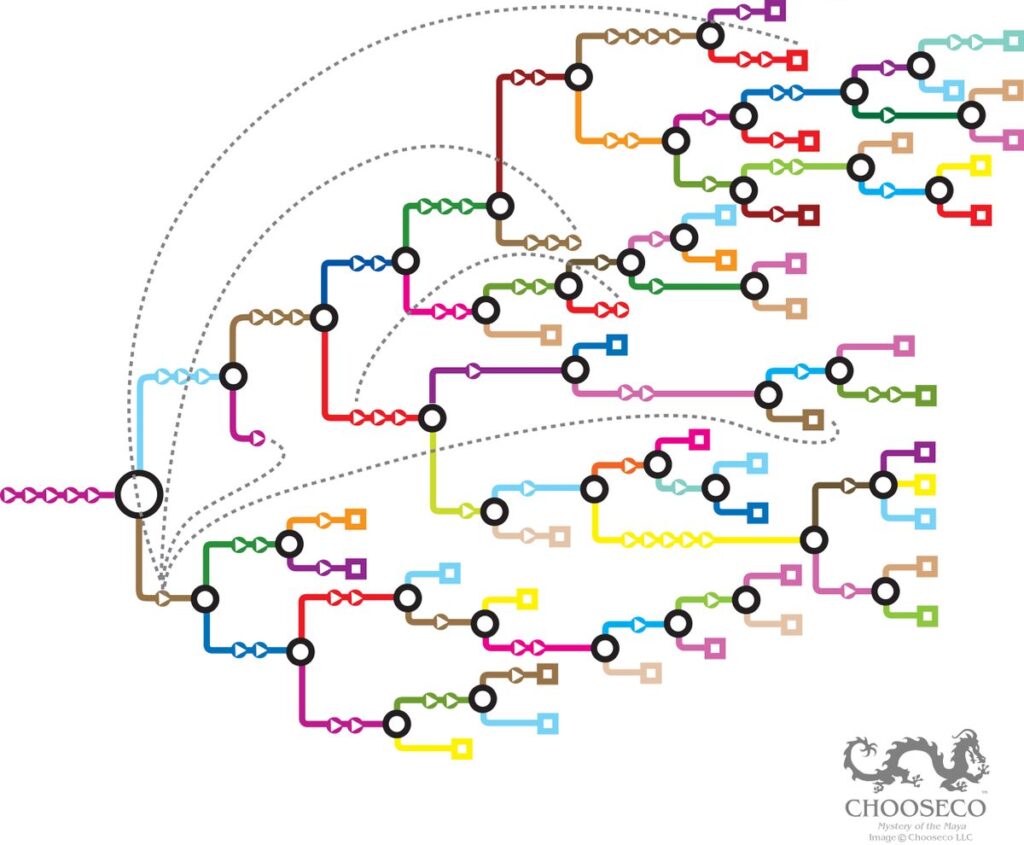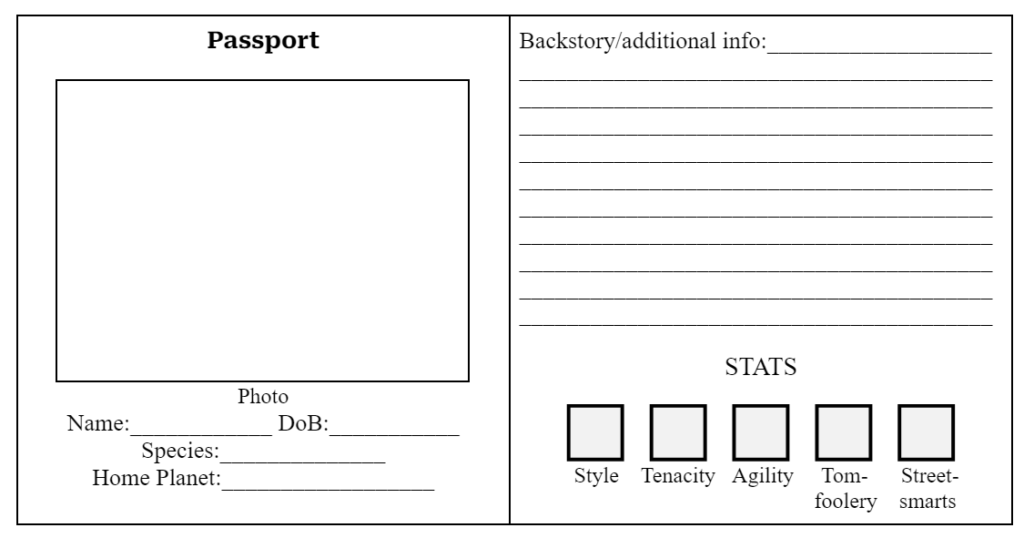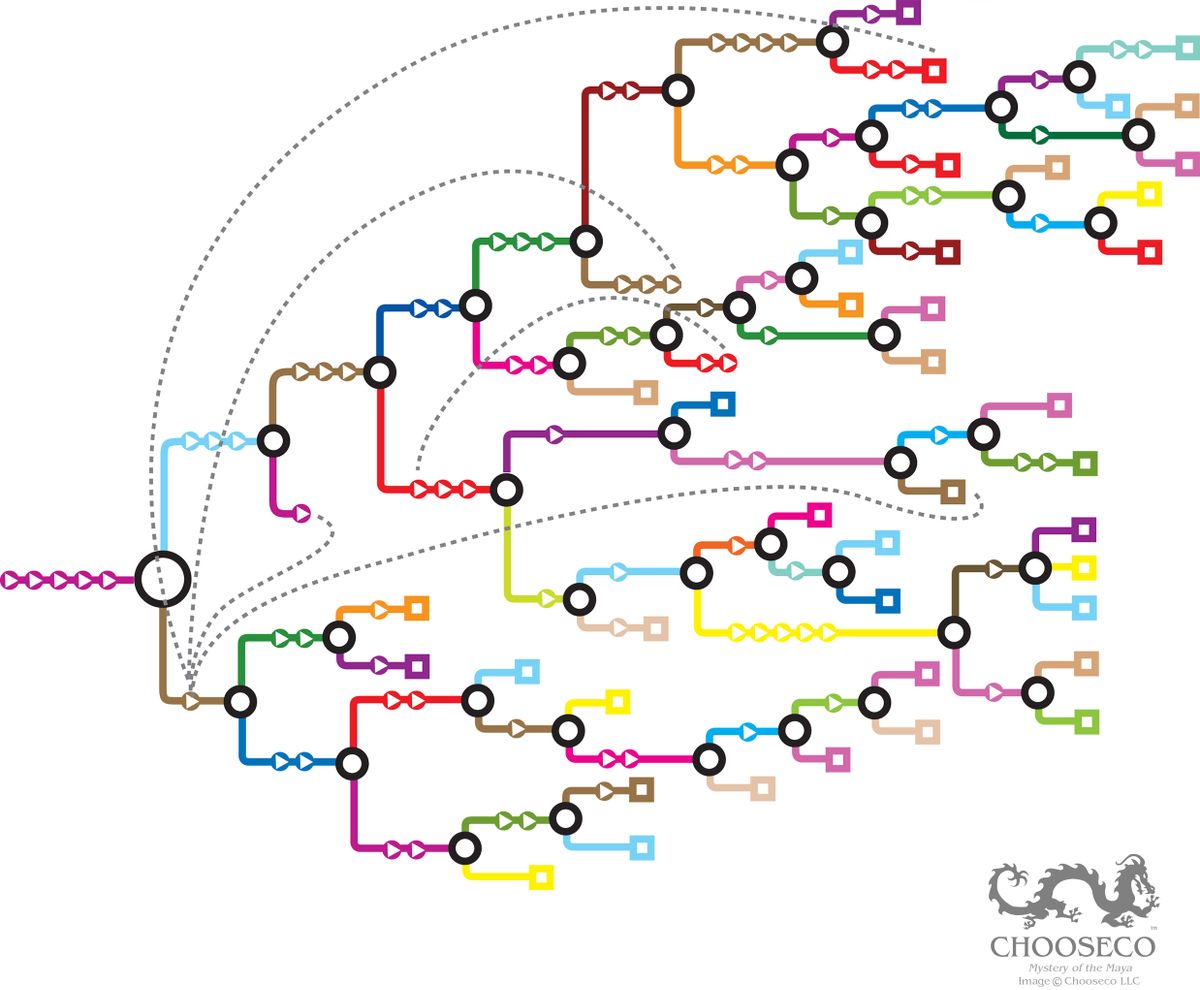Ben Adler, Ben Brown, Will Traband
UPDATE: After playtesting, we have decided to heavily revise our game. The main issues we wanted to address were:
- Storylines that were made by different people felt like they were for entirely different games. Some turned the game into an improv game with loose TTRPG elements while others leaned more into using player stats and making decisions. We didn’t have good standardization over what format each scene should be, how open-ended the choices should be, or what the “verb” of our gameplay should be: should players be describing a scene? Acting it out? Or making a group decision?
- The act of decision-making didn’t feel as impactful or fun as we wanted: players didn’t have a strong goal or game structure to inform their decisions, and while randomness and uncertainty can be fun, we were struggling with how vague our scenarios should be and how much we should telegraph what decisions will influence the story. There was also no tension between players to make decision-making more interesting.
- Players ignored creating a group relationship to inform their decisions and improv (establishing a concrete relationship between characters is one of the foundations of a good improv scene)
To solve these issues, we plan on making a few large changes. The core change is that this game will now be competitive, with players earning points and the player with the most at the end winning. To do this, we’re adding an element to the story that the characters are now making a TV program about spring break and are each given secret tasks from “the producers” that they have to complete to earn points. We and the play testers liked not having a GM in our game, but for this idea to work we may need a player who serves as the show’s audience and judges whether players completed their tasks, as well as gives points to their favorite player each day. This new aspect of the story gives players a more solid relationship right off the bat, and the points and tasks give players more incentive to make decisions and just play the game in general. Additionally, this kind of story supports a more linear plot, so we are going to cut down the amount of different paths and endings while streamlining and polishing them to make the game more cohesive.
The initial idea for our game was that of aliens living on Earth, which came from the exquisite corpse activity last class. Rather than create an RPG with characters doing fantasy or sci-fi stuff, we could add a layer of fantasy or sci-fi to ordinary activities having players play as characters who would find basic and mundane tasks to be weird and exciting. The game would be structured over a sequence of days with each day having a new task or scenario and hopefully culminating in some long-term goal. As we further fleshed out our game’s format, we decided that we didn’t want to use a system that had a lot of rules or required lots of dice or cards. Rather, we wanted a system that mainly focused on players doing improv. Our main inspiration for this game wasn’t a TTRPG at all, but actually the Choose Your Own Adventure book series.


The core idea of our gameplay emerged as a Choose Your Own Adventure type story where players act out an improv scene given a prompt or scenario. Then, what they do in that scene determines the prompt for next scene. That way, there is a balance of creator and player control in the narrative, since we essentially make the prompts for the players, they make the scene themselves, and their actions combined with our writing determine the next scene, giving the players’ actions consequences that are often a surprise. Here is an example scene from our game. These will be printed on the front and back of a page, so players do not see what actions determine which scene they get on the next day, giving the game more uncertainty.
Front
After checking into your hotel and enjoying an evening by the pool, your group meets up for an Earth tradition called “brunch” on Friday morning, as recommended by one of the Earth travel guides you read. You know that many of the spring breakers at your hotel plan on going to the beach today, but your group also got an invite to an exclusive nightclub. In addition, there is an Earth game called “NBA” happening tonight, and you got a special deal: tickets are only $25 each. There are sights to see, things to buy, and people to meet: you could easily blow the $100 you brought with you on souvenirs, drinks, and snacks. On the beach, you can see Earthlings splashing and swimming in the water, and playing in the sand. Some of them are using tools to make shapes and structures out of sand, tools you could buy from a nearby shop.
Discuss your group’s game plan for the day. Where will everyone be during the afternoon, evening, and/or late night? Do you want to stick together or split off into smaller groups? After you’ve decided, act out what it is you’ll be doing that day until you return to the hotel. When you’re all back, flip the page over.
Back
If your party decided to all go to the beach together at any point during the day, turn to page 11.
Otherwise, if your group spent more than $50 today or anyone went to the NBA game, turn to page 13.
Otherwise, turn to page 15.
We planned that there would be four days, where the first day would have 3 possible outcomes, each leading to their own scene, then each scene for the 2nd day would have 3 again, each scene on the 3rd day would have 2-3, and each scene on the 4th day would have 2 possible endings. (That’s over 31 scenes and 36 unique endings!) This meant that once we had written the first scene, we could split the writing evenly between the three of us.
Since our game focuses on improv, and improv is mainly comedic, we decided to give our game a comedic tone. Each scene in our game could be like an episode of a sitcom, with some scenes having a more connected storyline than others. Ultimately we decided on the setting of aliens visiting Earth for the first time and going on spring break in Miami to give the story a lighthearted, zany tone.
Finally, we decided to include character sheets that were smaller and emphasized things like appearance and backstory which would help. Since our player characters are aliens travelling to Earth, we made our character sheets into passports. We also decided to include character stats, but have them be abnormal stats like “Tomfoolery” and “Style” as a way to prod the players’ imaginations and help them decide how their characters should act, rather than being used to determine damage or skill checks like in a traditional TTRPG.

